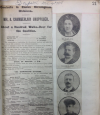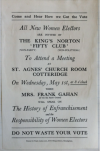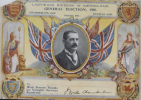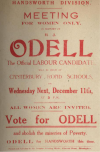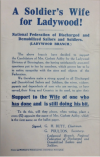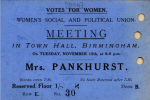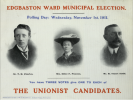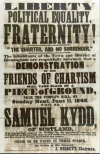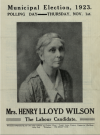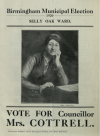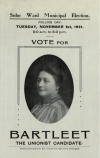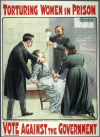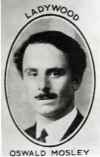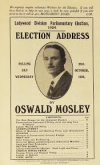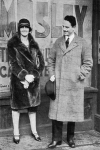-
Welcome to this forum . We are a worldwide group with a common interest in Birmingham and its history. While here, please follow a few simple rules. We ask that you respect other members, thank those who have helped you and please keep your contributions on-topic with the thread.
We do hope you enjoy your visit. BHF Admin Team
You are using an out of date browser. It may not display this or other websites correctly.
You should upgrade or use an alternative browser.
You should upgrade or use an alternative browser.
General Election history, Birmingham
- Thread starter Mark Tooze
- Start date
Eric Gibson
master brummie
My mother was a Liberal voter, at the post war election the liberal candidate Nora Hicks used our front room as a campaign office, I well remember her telling everyone that Labour were a terrible lot and a vote for them would be wasted.
She didn't get in the Labour man won.
At the next election she stood as a Labour candidate and got elected, she was later elevated to Dame Nora.
She didn't get in the Labour man won.
At the next election she stood as a Labour candidate and got elected, she was later elevated to Dame Nora.
I did the count a few times at Slade Road School in the 70s (including the 1979 General Election). You had to be very quick and very accurate. It got a little annoying when party officials appeared over your shoulder, every few minutes to check what you were up to (I was counting, wasn't it obvious....  ).
).
pjmburns
master brummie
That's why I always make sure I vote. Thinking of what they went through to get us the vote.The last message shown could refer to the shocking treatment applied to women at our own Winston Green Prison.
farmerdave
master brummie
The first time I voted was in 1964 for the Hall Green constituency. You had to be over 21 in those days. Voting took place at the Army Drill Hall which was on the Stratford Road almost opposite Cateswell Road. The Tory candidate, Aubrey Jones, was elected.
Smudger
master brummie
Back in the early days of the General Election could anyone stand for parliament, or did you have to be "someone" such as a solicitor, businessman, Aristocrat or like today Screaming Lord Such or Miss whiplash. I had a (mad ) friend who tried to stand as " The Curry Party" Luckily he couldn`t raise the deposit. How much was the deposit back in the 50`s ?
The ability to stand for Parliament has usually gone hand-in-hand with the ability to vote. Only after men without property were allowed to vote were men without property allowed to stand for Parliament. Only after Women were given the vote were women allowed to stand for Parliament etc... I guess if 16 year olds are given the vote, then 16 year olds will be allowed to stand for election.Back in the early days of the General Election could anyone stand for parliament, or did you have to be "someone" such as a solicitor, businessman, Aristocrat or like today Screaming Lord Such or Miss whiplash. I had a (mad ) friend who tried to stand as " The Curry Party" Luckily he couldn`t raise the deposit. How much was the deposit back in the 50`s ?
I've added 'history, Birmingham' to the thread title to make it clear this thread is about past elections and their Birmingham connections.
Eric Gibson
master brummie
In my earlier post I named Nora Hicks it was actually Nora Hinks...........................old age don't come alone.
The passing of the 1832 Reform bill established Birmingham as a parliamentary seat with its own MPs for the first time, greatly aided by pressure groups like the Birmingham Political Union, founded by Thomas Attwood and others. The bill's tortuous passage, with prorogations of parliament and bitter fights between the commons and lords feels to me very reminiscent of the turmoil that surrounded Brexit legislation in recent years, and similarly exacerbated deep splits within the Tory government of the day.
In the first ballot for the reformed electorate, anti-slavery campaigners made abolition a defining issue of the general election in late 1832, dividing Earl Grey's Whigs (broadly for) and the Duke of Wellington's Tories (broadly against). The ensuing vote saw a landslide against the Tories almost on the scale of yesterday's result, and elected Birmingham's first MPs in Thomas Attwood and his BPU deputy Joshua Scholefield.
Here's Thomas Attwood's victory statement, as published in Aris's Birmingham Gazette on 31st December 1832:
In the first ballot for the reformed electorate, anti-slavery campaigners made abolition a defining issue of the general election in late 1832, dividing Earl Grey's Whigs (broadly for) and the Duke of Wellington's Tories (broadly against). The ensuing vote saw a landslide against the Tories almost on the scale of yesterday's result, and elected Birmingham's first MPs in Thomas Attwood and his BPU deputy Joshua Scholefield.
Here's Thomas Attwood's victory statement, as published in Aris's Birmingham Gazette on 31st December 1832:
Source: The British Newspaper ArchiveTO THE ELECTORS OF THE BOROUGH OFGentlemen,
BIRMINGHAM.
I BEG leave to return you my sincere Thanks for the distinguished honour which you have done me in electing me one of your Representatives in the first Reformed Parliament. Nothing is more gratifying to me than to find my motives and my conduct generously estimated by the men who are most competent to judge of them.
Gentlemen, the gates of the Constitution are at length opened, in some degree, to the People. The great work which our fathers shrunk from, the People of England have now accomplished, in three short years, as legally, as peacefully, and as gently as the infant draws the milk from its mother's breast. It shall be my study, Gentlemen, to take care that the milk of the mother is not turned to gall in the infant's month.
Gentlemen, I have seen enough to convince me that Vote by Ballot is necessary to protect the freedom of election. I believe that Triennial Parliaments are our constitutional right; and I trust that the day is not distant, when we shall obtain a large extension of the elective franchise.
Gentlemen, I go to Parliament to obey your will, to represent your interests, and to assist in confirming the liberties of the country, and in restoring the happiness of the people. To these sacred objects I shall direct my anxious attention, endeavouring, as far possible, to reconcile the duties of the good citizen and of the good subject with each other. I deem the ample demand for labour, and the fair and just wages of the workman, to be the most sacred rights in nature, and the greatest blessings in civilized life. I know that these can only exist through a general state of prosperity in agriculture, manufactures, and commerce. Therefore the restoration of this general state of prosperity will be the paramount, and all absorbing object of my heart. I have all along foreseen that unless we obtain the restoration of general prosperity among the industrious classes, the restoration of our liberty will have been effected in vain. If the present state of things is much longer to be continued, the liberty will but precipitate the anarchy, as I have often declared, and every thing will go to chaos in England. I trust to the wisdom and patriotism of the Reformed Parliament to prevent this terrible catastrophe by wise and upright legislation. I trust that they will adopt measures, which will shortly restore and confirm the general prosperity of all. In this case, Gentlemen, I am fully convinced, that the liberty and the prosperity will work hand in hand together, and that the child in the cradle will never live to hear the voice of discontent in England.
Requesting, Gentlemen, that you will have the kindness to continue towards me the same liberal and generous interpretation of my conduct which I have so long experienced, I have the honour to remain, with sincere respect and esteem,
Gentlemen, your faithful and humble servant,
THOMAS ATTWOOD.
Birmingham, Dec. 14, 1832.
Last edited:

